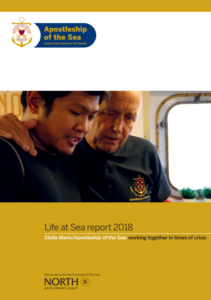British charity Apostleship of the Sea issued their Life at Sea report detailing cases they have encountered while providing support to seafarers around the world in 2017-2018. These stories, summarizing the eight challenges that crews of today have to face, aim to demonstrate that, by working in partnership, we can all improve the lives of seafarers and fishermen around the world.
- Hospitalisation: Seafarers endure the daily risks of an industrial workplace as well as a dangerous natural environment, and injuries sustained can be serious. For a seafarer in a foreign land, for the crew who must continue to the next port, and for family miles away, hospitalisation can be extremely lonely and stressful.
- Assault and bullying: There is little documentation about assault and bullying at sea – but we know it is a reality for too many seafarers.
- Death at sea: Death at sea is higher than ashore and suicide rates are an increasing concern. A seafarer’s death is devastating for family and colleagues, and people often long for spiritual support and comfort:
• 2,000 seafarers lose their lives at sea each year from natural causes and accidents
• 15% of deaths at sea are by suicide - Piracy: Piracy is a terrifying experience for seafarers and it is on the increase: IMB reported 201 piracy incidents in 2018. Piracy, and the threat of piracy, can have a lasting effect on seafarers’ wellbeing and mental health. Swift intervention is essential to minimise the impact of a pirate attack, so seafarers can return to work with confidence.
- Abandonment: More than 1,300 seafarers were abandoned in the five years 2012-2016, with an average of 19 crew abandonments each year, according to ILO data. Cases of crew abandonment are increasing and ever more seafarers find themselves unsupported in foreign lands. Uncertainty over wages and repatriation can take years to resolve. While seafarers wait, they need vital support to live onboard.
- Stress and mental health problems: Seafarers suffer stress for many reasons: They are away from family, they may be worried about loved ones, and they lack quality sleep. Over a third of seafarers say they have no one to talk to onboard, and communication with home can be sporadic. The extreme temperatures, claustrophobia, and heavy seas also take their toll.
- Non-payment of wages: It is hard to pinpoint the scale of this problem in the shipping industry today. Back in 2015, ISWAN recorded almost 400 reports of non-payment of wages.
“We know from our experience of supporting seafarers that it remains their top concern.” - Refusal of shore leave: Seafarers’ rights to shore leave have recently been strengthened, but being refused shore leave is still a major source of stress for seafarers.
Together, we can improve welfare through regular ship visits, and help seafarers through what may be the most difficult times of their lives…These stories demonstrate the vital importance of our work – and show that, by working in partnership with you, we can all improve the lives of seafarers and fishermen around the world,
…said Martin Foley, National Director, Apostleship of the Sea.
Explore more in the official report herebelow:


































































